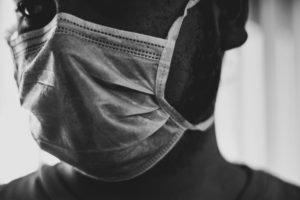
Ben Crump Opinion contributor
Blacks are dying at disproportionate rates. Two black men report cop kicking them from store for wearing protective masks. Equity in response is desperately needed, in justice system and beyond.
We’ve long known that it’s dangerous to be black in America.
We’ve all watched cell phone and body cam footage of unarmed black men with their hands raised in surrender who are shot and killed by police. We’ve seen people of color shot in the back while running away, and police officers at a routine traffic stop taking on the role of executioner.
Unarmed black Americans are more likely to be shot and killed by police than whites.
For a free legal consultation, call 800-959-1444
Now, the familiar existential threat that black people endure — the one that prompts us to have “the conversation” with our kids — is colliding with a new existential threat: COVID-19 is killing black people in America at an alarming and disproportionate rate.
When black men report (and record) being stalked by a police officer at a Walmart and kicked out for wearing protective masks, we see once again that the rules are different for our community. And absent an intensive effort to counteract the disparities facing communities of color, this devastation will continue, with the ruin recorded in body bags, battered lives and broken communities.
Click to contact our personal injury lawyers today
President Donald Trump recently speculated that the ability of celebrities, athletes and politicians to access COVID-19 tests over more vulnerable individuals was just “the story of life”. It’s time to rewrite the story of COVID-19’s impact on black people, the poor and the marginalized in America, while there’s still time.
Here are five essential steps to make this a story of hope, not horror, starting with the police:
First, encourage black Americans to wear masks for their protection against COVID19 — and make sure police do not racially profile them for doing so. Some blacks are reluctant to wear masks now because they fear how police will respond. Police need to know that we are not bank robbers wearing masks; we are people trying to stay alive.
Complete a Free Case Evaluation form now
Second, equalize access to testing and treatment. The first numbers from several states document that more people of color are contracting and dying from COVID-19. In Illinois, black people account for 41% of COVID-19 deaths while making up only 14% of the population.
Similar patterns are being reported in Michigan, North Carolina, Wisconsin and Florida.
Is this due to the risk factors that plague people of color? Lower incomes and diminished access to health care mean more chronic health problems like high blood pressure and diabetes.
Crumbling infrastructure, cramped living quarters and other markers of environmental racism mean higher transmission rates. Or is implicit bias limiting access to tests, treatment and
life-saving equipment? We need to collect racial data on who’s being tested and find out now.
Third, ensure racial equity in prison release plans. People of color make up a disproportionate share of our prison population, which could become a death sentence, given the likely spread of the virus in crowded prisons. U.S. Attorney General William Barr recently ordered the release from federal prison of low-risk prisoners who are elderly or sick to prevent widespread transmission of COVID-19. But his formula to calculate risk would allow for the release of only 7% of black male inmates, according to a Marshall Project report, heaping injustice on top of injustice with deadly high stakes.
Fourth, ensure broadband access to low-income families. Though many employers have shifted their business operations to work-from-home models, people who worked in some of the hardest hit sectors and depend on hourly wage jobs don’t have that luxury, and these are disproportionately people of color. Ironically, without internet access at home, displaced workers can’t apply for unemployment benefits and access their share of relief. And their children will miss a year of education. According to the Pew Research Center, 35% of homes with school-aged children and an annual income below $30,000 a year lack a high-speed internet connection at home, compared with just 6% of such households earning $75,000 or more a year.
With no end in sight to stay-at-home guidelines and orders, it is imperative for the Federal Communications Commission to meet the need by temporarily expanding the scope and size of the federal Lifeline program, which helps low-income households access technology based services.
Fifth, use the next stimulus package to invest in rebuilding the infrastructure of some of our most struggling cities, places like Detroit and Newark. This may represent the biggest opportunity to rewrite the story of black and brown Americans, who have borne the effects of environmental racism in cities that have suffered from years of neglect and decline. Imagine what an infrastructure bill could mean for a city like Flint where, six years after major environmental concerns were found, residents are still reluctant to drink the water.
For black and brown people, the story of our lives is rife with endemic injustice, from excessive incarcerations to inadequate access to education and health care to exposure to environmental hazards borne out of poverty and racism. COVID-19 will make it worse — unless we insist on rewriting the story.
Ben Crump is a civil rights attorney and founder of the national law firm Ben Crump Law, based in Tallahassee, Fla.
Call or text 800-959-1444 or complete a Free Case Evaluation form




